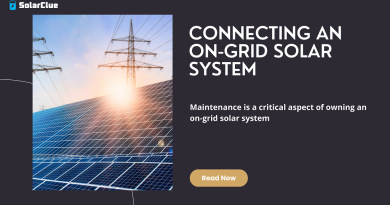When And How Are Solar Panels Most Efficient
Table of Contents Solar energy remains a fascinating concept for most people and an abundant resource most businesses and homeowners are keen to tap into for their energy needs. The idea of garnering power directly from the sun’s rays and converting that into usable electricity, significantly reducing dependence on the traditional power grid, is indeed appealing. Furthermore, solar energy is renewable, infinite, and clean, significantly contributing to global efforts to combat climate change. However, the efficiency of solar panels in capturing, converting, and transmitting this energy becomes a critical factor in the solar energy debate. In this article, we explore how and when solar panels are most efficient as well as how one can optimize their solar panel system for better efficiency. The efficiency of a solar panel refers to its ability to convert sunlight into usable electricity. Efficiency is determined by the amount of sunlight that a panel can convert into electricity, denoted as a percentage. For instance, if a solar panel has an efficiency rating of 20%, it means that 20% of the sunlight that hits the solar panel is converted into electricity. Factors that influence solar panel efficiency include the type of solar cell used, the configuration and arrangement of the cells, and the quality of the materials. Understanding when solar panels are most efficient is crucial for individuals and businesses looking to harness solar power. Solar panels are most efficient during peak sunlight hours, typically between 9 AM and 3 PM. During these hours, the sun is high in the sky, and the angle of sunlight hitting the panels is optimal, resulting in more electricity generation. Besides, solar panels are more efficient during the summer months, especially in sunny regions, due to longer daylight hours and increased sunlight intensity. There are various tactics to increase the efficiency of your solar panel system. Primarily, the positioning of the solar panels can significantly affect their efficiency. Solar panels should be installed in a location with maximum sun exposure, facing south in the Northern Hemisphere and north in the Southern Hemisphere. Additionally, the tilt of your solar panel should match the latitude of your location for optimum sunlight capture throughout the year. Regular cleaning of solar panels is essential as dust, debris, leaves, and other obstructions can reduce the amount of sunlight hitting the panels and hence their efficiency. Quality of the solar panels also heavily influence their efficiency. High-quality panels made from advanced materials will have higher efficiency rates than cheaper, lower-quality alternatives. Consequently, while they may be more expensive upfront, they could provide higher returns in the long run due to their increased energy output. The pursuit of harnessing solar energy for powering homes, industries, and governments continues to intensify, driven by environmental awareness and the need to transition towards green, renewable sources of energy. To achieve this, understanding the factors that affect the efficiency of solar panels is crucial. Knowing when solar panels are most efficient helps in proper planning and maximizing the energy yield from these systems. Additionally, adopting several practices, including correct positioning, regular cleaning, and choosing high-quality materials, are critical to boost the efficiency of solar panels. While upfront costs may be higher, the long-term savings and benefits of high-efficiency solar panels certainly make them a viable and sustainable energy solution for the future.Introduction
Understanding Solar Panel Efficiency
When Are Solar Panels Most Efficient
How To Maximize Solar Panel Efficiency
Conclusion


